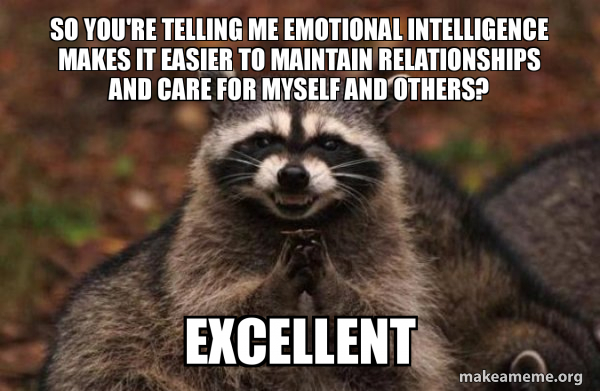
When I teach leadership classes I try to instill in my class that there are three important leadership traits that will help them stay on the leadership track.
- Authenticity counts – forget about eloquence, focus on being real.
- Visibility is a form of communication – get out there and be consistently seen.
- Listening is a powerful tool – active listening is a skill that needs to be constantly honed.
I think a skill that can also be honed is emotional intelligence or EQ. Emotional intelligence in a leader can help them read their people as well as they can read books. Ever had one of those leaders who couldn’t read the room and barreled on and made moral worse? If that leader had known the basic concept of EQ, would it make a difference to the team? I think it does.
In my experience leaders who have a sense of EQ stay cool under pressure. They don’t hide from their feelings but learn from them. They understand others better, and they communicate more effectively than the “clueless” ones. Sounds perfect, right? Don’t we all wish we could do those things. In the interest of honing and learning new skills, here are 5 components of EQ and a brief summary on how to use them as a leader.
- Self-awareness. This is the leader’s ability to recognize and understand their own moods and emotions and how their state of mind affects others on their team. Knowing your own frame of mind and communicating with your team (not over sharing, think of it as a public service announcement instead) can help misunderstandings.
- Self-regulation. This involves the leader being able to control their impulses and moods and think or pause before acting. Self-control in the sense of being optimistic (be like Ted Lasso!) vs. being pessimistic. Self-regulation is focusing on being forward thinking instead of reactionary. Process your feelings instead of taking them out on your team.
- Internal motivation. Know your WIIFM (What’s in it for Me?). Do you know your WIIFM? Why are you in this leadership role? Do you know your team’s individual WIIFMs? Understanding the difference between intrinsic (internal) and extrinsic (external) motivations can help you, as a boss lead your people in a way that motivates them. There is not meant to be judgement in this exercise, just acknowledgement of what drives the individuals on your team.
- Empathy. Leaders need to be able to understand emotions and empathize when someone is struggling. I am not saying you need to fall for every sob story that comes your way. But acknowledging that a team member is frustrated and giving them an outlet to safely “vent” can help them move past their hurt, anger, or frustration and get back to being productive. Empathy helps us accept their feelings without judgement or more importantly, listen to them without the need to fix it. You are acknowledging their feelings without owning them.
- Social skills. The aspect of social skills in the EQ realm is the ability to properly manage your own and other’s emotions to connect, interact and work with others. Think about that networking event you went to and you “got stuck” with someone who didn’t ask you one thing about your business or life and instead went on for a 20-minute monologue about how you can help them. There is no bonding there, just boredom!
As a leader many of us use EQ without realizing that is what we are doing. Keep it up! Remember to check in with your own emotions before taking them out on your team. Get to know your team and what drives them and give them goals and direction that coincide with their WIIFM.
You will find incorporating these EQ techniques can help your communication flow, enhance your ability to inspire and motivate your team, reduces stress for you and your team members, and allows you to be that authentic supportive leader that you are destined to be.
Want your team members to learn more about leadership? Reach out to me to learn about our training modules which will elevate yours, and your team leader’s, leadership skills.
